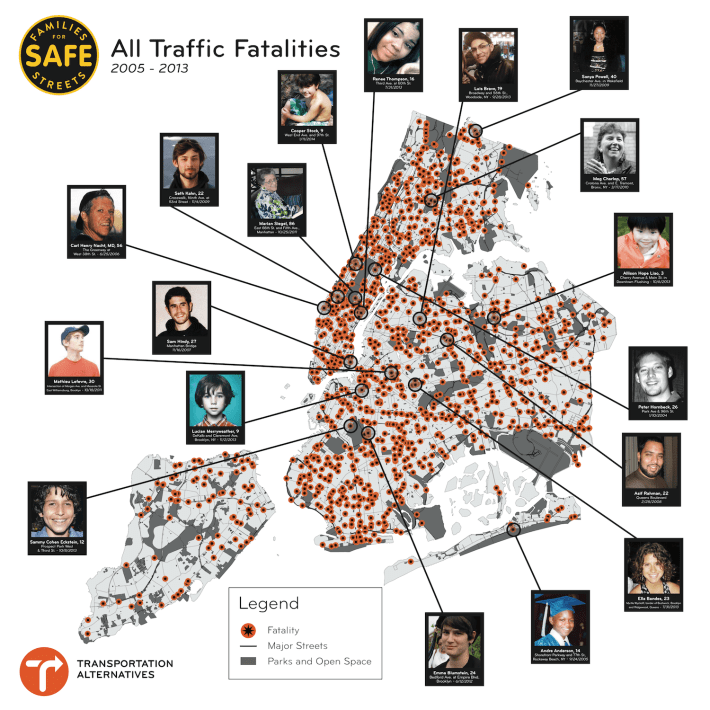
The State Senate budget released late last week includes a plan to expand New York City's school zone speed enforcement program from 20 cameras to 180 cameras. As the Senate, Assembly and Governor Cuomo enter budget negotiations, families of traffic violence victims are in Albany today to meet with legislators and push for policies that would do more to reduce traffic violence: lowering the citywide speed limit and giving NYC control of automated enforcement.
Amy Cohen, whose son Sammy was killed on Prospect Park West last October, is one of the organizers of Families for Safe Streets. At the group's second monthly meeting earlier in March, its members decided to make the trip to Albany. Today, about a dozen people who lost their children to New York City traffic violence, or were injured themselves, got up before dawn and boarded a bus to the capital.
"Many of the families that are going don’t tend to know the different legislative options," Cohen said. "Most of the people going haven’t been to Albany for this kind of thing."
Families have set up meetings with more than 30 lawmakers, including their own representatives and legislators from the places where their loved ones were killed. The day includes meetings with Speaker Sheldon Silver, Assembly transportation committee chair David Gantt of Rochester, and members of the Black, Puerto Rican, Hispanic and Asian Legislative Caucus.
Gantt has opposed automated enforcement bills before, citing privacy concerns even when the NYCLU has signed off on legislation. "The only thing he has to do is look at our group and realize this is an equal opportunity killer," said Cohen, who added that not everyone who wanted to go on today's Albany trip could make it. “It is harder for some of the members who are not as well off to get the time off from work. We only planned this a week in advance." The group has scheduled a larger trip to Albany featuring families and supporters on May 6.
When they meet with legislators today, families will give them a map [PDF] of New York City traffic fatalities and a brochure with information about their loved ones [PDF]. "We’re encouraging everybody to tell the person they meet with about who they lost and why the change is important," Cohen said. The families will end the day with a press conference in Albany, and they invite lawmakers to join them to speak with the media about traffic violence.
The families have two big requests: Setting the default citywide speed limit at 20 mph and securing home rule over New York City's speed cameras.
There are two bills in Albany to lower New York City's default speed limit: One, from State Senator Brad Hoylman, would lower it to 25 mph, the limit favored by Mayor Bill de Blasio's Vision Zero report. A second bill, sponsored by Assembly Member Dan O’Donnell and State Senator Martin Malave Dilan, would set the maximum default speed for surface streets at 20 mph. Both bills would continue to allow a higher speed limit where the City Council deems appropriate.
"It’s clear that 30 is way too fast," said Transportation Alternatives general counsel Juan Martinez, who is joining the families in Albany today. "We think that 20 is the best place to end up."
While the Senate budget expands the number of speed cameras New York City can operate by a factor of nine, it does not remove restrictions that shut the cameras off outside of school hours and prohibit them beyond very strictly defined "school zones" that don't even cover many streets with speeding problems on walking routes to schools. A resolution pending before the City Council transportation committee from Jimmy Vacca, Mark Levine, and Jimmy Van Bramer would ask the state to grant the city home rule over its speed camera program.
New York City isn't the only place where speed cameras are in play: In his executive budget, Governor Cuomo proposed allowing Nassau and Suffolk Counties to join New York City in launching school zone speed camera programs. This plan was rejected in the Assembly's budget [PDF], but appears in the Senate proposal [PDF].
Last year, the situation was reversed: NYC speed cameras appeared in the Assembly budget but not in the Senate's plan. Although the enforcement program was not included in last year's final budget, the current 20-camera program later passed, with school zone restrictions attached, after an effort led by Senate Co-Leader Jeff Klein of the Bronx.
Negotiations for this year's budget are set to continue over the next two weeks before the budget takes effect for the fiscal year beginning April 1.





